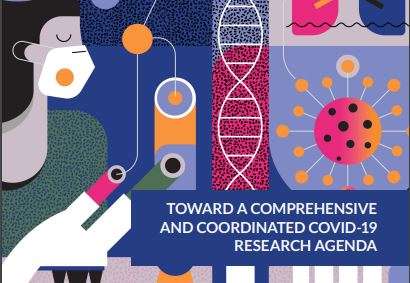The COVID-19 Research Working Group has issued a report that outlines urgent recommendations for a coordinated federal COVID-19 research agenda that covers pharmaceutical and nonpharmaceutical approaches to the pandemic response.
While the United States has seen significant progress in COVID-19 vaccine development—including the recent authorization of two vaccines—coordinated research around diagnostics, prevention, and therapeutics has lagged sorely behind. Even with the roll out of a highly effective vaccine, COVID-19 will continue to take a terrible toll on the lives of people in the U.S. and around the world for at least the next year. Developments in therapeutic, diagnostic, behavioral, implementation, and non-vaccine prevention research will save lives.
This report, sponsored by PrEP4All and written by advocates and public health experts from the University of California, San Francisco, Columbia University, and New York University, has been distributed to President-elect Joe Biden’s COVID-19 Advisory Group, federal agencies, and other stakeholders.
Two members of ICAP’s leadership – Wafaa El-Sadr, MD, MPH, MPA, global director of ICAP, and Jessica Justman, MD, ICAP’s senior technical director, were co-authors of the report.
“In order to accelerate identification of diagnostic, prevention and treatment for COVID-19, a comprehensive strategy is urgently needed,” said El-Sadr. “This report outlines key areas that an effective COVID-19 research agenda must address, and will serve as a starting point for discussion and analysis of current research and future research efforts.”
“The report raises a number of important questions, such as: What are the most efficient and important means of transmission of SARS-CoV-2? To what degree does risk vary by exposure? Which interventions will best enhance vaccine uptake to help achieve adequate coverage? What are effective strategies for addressing racial and social inequalities around COVID-19 and other health disparities? And many others,” said Justman.
Globally, the United States has borne the greatest burden of this pandemic, with over 17 million cases and 310,000 deaths to date. Citing shortcomings in the federal COVID-19 response, the report argues that a directed and wide-ranging research strategy is needed to address COVID-19 and future pandemics.
“Since the beginning of the COVID-19 crisis, the federal government has had critical gaps in its response, including deadly delays in our testing capacity and a scattershot clinical trial response that led to patients being treated with useless drugs like hydroxychloroquine,” said Dr. Joseph Osmundson, Clinical Assistant Professor of Biology at New York University and one of the co-authors of the report. “The United States needs to pivot toward a research-driven, science-based, justice-oriented pandemic response that will build our capacity to save lives next year, and for the pandemics that will arise in years to come.”
The group’s recommendations include the development of rapid, easy-to-use home-based COVID-19 tests, head-to-head studies comparing similar pharmaceutical interventions, research on how individuals and communities make decisions on how to engage with others during COVID-19, and how to motivate people to adopt protective measures. “We urgently need a comprehensive research response that puts the ‘public’ back in ‘public health’”, said Dr. Judy Auerbach, sociologist and Professor of Medicine at the University of California, San Francisco, another co-author of the report. “That means including research on how people navigate risk and make behavioral choices in an emerging epidemic characterized by uncertainty and evolving scientific knowledge.”
In addition to COVID-19 specific recommendations, the report details how the federal government can better prepare for future pandemics, such as creating a dedicated office focused on preparedness and response.
“Research into the myriad of biomedical, behavioral, and environmental issues that arise from the COVID-19 pandemic requires a coordinated and proactive effort from the federal government that spans all relevant agencies and institutions in partnership with industry, private donors, health care systems, and affected communities,” said Matt Rose, Director of U.S. Policy & Advocacy at HealthGAP and another co-author on the report.
———————
About the COVID-19 Working Group-NY: The COVID-19 Working Group-NY is a coalition of healthcare professionals, scientists, social workers, community workers, activists, and epidemiologists committed to a rapid and community-oriented response to the COVID-19 pandemic.
About ICAP: A major global health organization that has been improving public health in countries around the world for nearly two decades, ICAP works to transform the health of populations through innovation, science, and global collaboration. Based at Columbia Mailman School of Public Health, ICAP has projects in more than 30 countries, working side-by-side with ministries of health and local governmental, non-governmental, academic, and community partners to confront some of the world’s greatest health challenges. Through evidence-informed programs, meaningful research, tailored technical assistance, effective training and education programs, and rigorous surveillance to measure and evaluate the impact of public health interventions, ICAP aims to realize a global vision of healthy people, empowered communities, and thriving societies. Online at icap.columbia.edu








